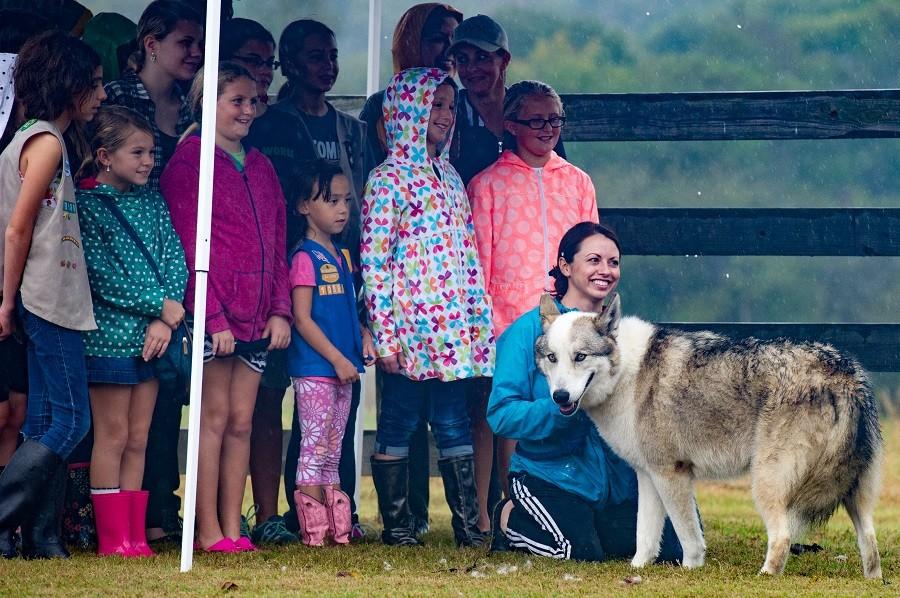The Wolves Of Saint Francis
The Saint Frances Wolf Sanctuary in Montgomery, TX hosted a open day on Oct. 24.
November 2, 2015
Once upon a time in the city of Gubbio, in the Italian province of Perugia, the town folk began whispering among themselves of a wolf seen in the fields that had been coming in and attacking their livestock. It didn’t take long for those whispers to become full-fledged screams as he began attacking humans — and eventually chose to dine solely on them.
Gubbio had a real problem on its hands. The wolf lurked just outside the city gates preying on anyone who ventured past them alone and soon the town was under siege, as no weapons did the wolf any harm and anyone who attempted to destroy him was horrifically killed.
A local friar named Francis stepped in, telling the citizens of Gubbio that he could make the wolf cease its relentless attacks, “Brother wolf, thou hast done much evil in this land, destroying and killing the creatures of God, and all the inhabitants of this city are thy enemies,” but, he said, he would offer him a reprieve.
“As thou art willing to make this peace, I promise thee, that thou shalt be fed every day by the inhabitants of this land so long as thou shalt live among them. If I obtain all this for thee, thou must promise, never again to attack any animal or any human being; dost thou make this promise?”
The wolf, as wolves do, placed his paw on Francis’ hand in agreement to the oath and the city gained a new canine citizen.
It’s no wonder he became Saint Francis of Assisi — patron saint of animals and the namesake for the Texas, Montgomery-area wolf sanctuary who held their annual open day this past Saturday.
Since 2002, Saint Francis Wolf Sanctuary has provided care for wolves, wolf dogs and even dogs that simply look like wolves. It is part of a network of 20 – 25 wolf sanctuaries around the country who seek out animals that have been inappropriately kept as exotic pets and provide them with a comfortable home for the rest of their lives.
Jean LeFevre — the founder of the Sanctuary — likes to say that it was actually Mystery, the first rescue, who did so. Mystery came, like most of the animals, from an abusive breeder. She was brought to Texas from Arizona, but escaped her enclosure at NAWA and found her way to LeFevre, who was inspired to create a place where all wolves could be safe.
Throughout history, wolves have had a terrible reputation in their relations with humans. Besides the few who found homes with our ancestors thousands of years ago and eventually became the pet dogs we love today, wolves have been known as the ultimate predators – smarter than dogs (and some humans), master escape artists and fierce hunters.
One would be then be surprised to learn that there have only been five to ten actual documented wolf attacks in history — mostly because of their predisposition to avoid people at all costs.
In the urban wild, a designation as a wolf or wolf dog is a death sentence for any stray animal. Though Saint Francis maintains a very positive relationship with animal control, usually if a dog is found to have many wolf-like traits it will be euthanized.
The sanctuary houses wolves of a wide variety of content — in wolf-speak high content and low content refers to how much “wolf” the animal actually is. It ranges from Sable, who is 100 percent dog to Mystery, who is 100 percent wolf.
Saint Francis aims to educate people about the differences between dogs and wolves – from the physical differences: wolves’ snouts point up, they have yellow eyes and black nails, smaller ears, etc. — to misconceptions about keeping them as pets: always a bad idea for wolves, they are not able to be socialized and are at their core wild animals.
They’re not all bad. Two of the furry friends at Saint Francis have been deemed “ambassadors,” that is, they’re taken for walks every Saturday morning and can be sociable with people. As a non-profit, they rely on private donations — every penny donated to Saint Francis goes back to the care of the wolves.
You can visit Saint Francis Wolf Sanctuary at WolvesOfSaintFrancis.org to schedule a tour or learn more.





























